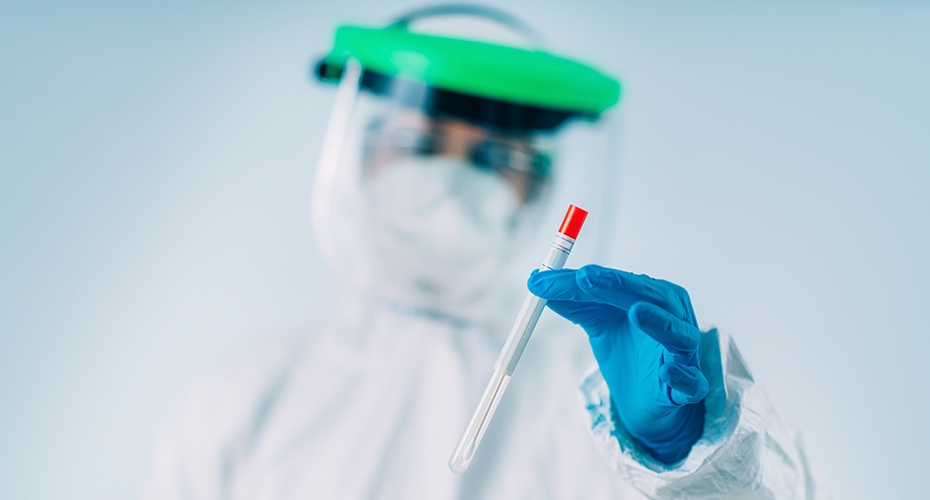Jun 8, 2020
What you should know about COVID-19 tests
How do COVID-19 tests work, and what do they really tell us? Clinicians are offering guidance as a new wave of tests hit the market, with varying levels of accuracy and usefulness.
The medical terms for these tests may seem confusing, said Desiree Otenti, senior director of medical policy for Blue Cross Blue Shield of Massachusetts, but as the tests become increasingly available, it’s important to understand what they’re used for, how they work and how reliable they are.
COVID -19 tests are covered by insurance if they are FDA-authorized and medically necessary. Tests that are not ordered by a clinician and not related to diagnosis or treatment -- for instance, tests required for travel, school or work -- may not be covered.

What is a molecular (PCR) test and how does it work?
This is the most common diagnostic test for COVID-19, commonly known as “the nasal swab test.” If you have symptoms of COVID-19, your medical provider may order a PCR to diagnose whether you are currently infected. Specifically, it detects the presence of genetic material inside the virus – known as the RNA – in fluid collected from a swab inserted deeply into the nasal passage. The sample is amplified using a method called polymerase chain reaction (PCR), and then run through a machine that has nucleic acid probes that detect viral RNA.
What does that mean?
The process is analogous to zipping a zipper, Otenti said.
“The probe is one side of the zipper, and the RNA is the other,” she said. “If the RNA in the fluid is coronavirus, it will align and ‘zip.’ If it is flu or another illness, it won’t interlock.”
Is it reliable?
This type of test is generally accurate if the timing is right and the swab sample is done correctly, Otenti said. A clinician has the best chance of picking up the virus on the swab in the first few days that the patient starts to have symptoms.
“As the days pass, and hopefully the patient is starting to feel better, there’s less virus swimming around, so you’ll be more likely to miss it,” Otenti said. “Getting a good sample where the virus is hanging out deep in the nasal passages is also important. If you don’t have a good sample, you can’t trust the results.”
There are about 30 types of molecular tests for COVID-19 approved by the FDA, Otenti said, and results are usually ready within one to two days.

What is an antigen test and how does work?
Like the PCR test, this test also detects whether you are currently infected with the novel coronavirus. This newer type of test received its emergency use authorization from the FDA last month. Antigen tests work quickly – within minutes – detecting fragments of proteins on or in the virus taken from nasal or throat swabs.
What does that mean?
The coronavirus’ “crown” of spiky proteins fits like a key into a host cell’s “lock,” Otenti said. The antigen test hunts that key.
Is it reliable?
Because this method is fast and less expensive than other tests, it works well when testing large numbers of people at once. Although a positive antigen result is considered highly reliable, the chance of false negatives is higher with antigen tests than other types.
“Antigen tests are not being used on a broad scale right now,” Otenti said. “A majority of tests being done are PCR.”

What is an antibody (serology) test and how does it work?
Antibody testing is not usually medically useful, but can be useful for researchers. Antibodies are proteins produced by the immune system to fight infection. This test detects whether you have produced antibodies to COVID-19, which generally start developing within one to three weeks after infection. Unlike the PCR test, specimens for antibody tests are collected through blood.
There are two types of antibodies that may be present: IgG and IgM. IgG antibodies usually indicate there has been an infection in the past, while IgM means there is likely an active infection in the body.
What does that mean?
“IgG antibodies can be considered watchmen on the wall-tower who have been battle-tested and know what the enemy looks like and how to fight it,” Otenti said, “while IgM antibodies are like soldiers on the field.”
Is it reliable?
The timing of antibody testing affects accuracy – if done too soon after someone is infected, the immune system hasn’t had enough time to mount a response and develop antibodies, and the results of testing will be less accurate. While the FDA has authorized certain antibody tests, Otenti notes much is still unknown about the virus and the antibody response.
“We don't know how long those IgG antibodies stand guard for, and we don't know how many guards you need on the wall to fight off the attack,” she said. “There's a lot of speculation, and it isn't good enough to hang our hat on.”
Does the presence of antibodies mean immunity?
This is what many people want to know, but the answer is, there is currently no clear answer. It is possible that having been infected by COVID-19 will reduce your chance of being infected in the future, but researchers do not yet have a reliable way of knowing who is protected or for how long, Otenti said.
The World Health Organization has cautioned that there's a lack of evidence that the presence of antibodies will prevent reinfection.
There is currently no evidence that people who have recovered from COVID-19 and have antibodies are protected from a second infection.
And the CDC tells health care professionals: “Do not use antibody tests to determine a person’s immune status until evidence confirms that antibodies provide protection; how much antibody is protective; and how long protection lasts.”
In other words, “antibody testing is a snapshot of the past, but cannot predict your future,” Otenti said, noting ongoing studies will eventually reveal more concrete information.
Antibody testing is used by epidemiologists for public health surveillance, for example, to determine how much of a large population has been exposed to a virus. Clinicians occasionally use the tests to confirm diagnosis when there is late onset of symptoms, but they cannot currently be used to determine whether you are vulnerable to infection in the future.
Who should get tested?
Your health care provider will determine whether a PCR or antigen COVID-19 test is medically necessary to diagnosis infection, Otenti said.
In general, it is recommended people get tested if they have symptoms including fever, cough, shortness of breath, chills, muscle pain, new loss of taste or smell, vomiting or diarrhea, and/or sore throat.
Otenti said if someone has been near a person with COVID-19 within a two-week time frame, there is also good reason to test for the virus.
“It’s important to note that no matter what results you get, you should still take recommended precautions” such as quarantining, she said. “Because of all of the unknowns, you need to play it safe either way.”
Of course, testing negative on a PCR, antigen or antibody test now does not mean you are not vulnerable to future infection. That’s why it’s important to continue the kind of commonsense physical distancing practices clinicians recommend.

Desiree Otenti is a senior director of medical policy for Blue Cross Blue Shield of Massachusetts
PHOTO OF DESIREE OTENTI BY MICHAEL GRIMMETT

